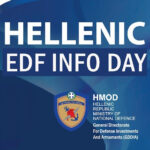THEON INTERNATIONAL PLC (THEON), one of the leading manufacturers of night vision and thermal imaging systems for defence and security…

Mr. Christian Chatziminas, Founder & CEO of THEON GROUP and President of the Hellenic Entrepreneurs Association, participated in the firechat with ERT’s journalist, Mrs. Adriana Paraskevopoulou, entitled “The role of re-industrialization and high technology in entrepreneurship and the national economy”. The latter has taken place in the framework of the Delphi Economic Forum IX.
Initially, Mr. Chatziminas stated that the investment in the re-industrialization of the country, one of the main positions of the Hellenic Entrepreneurs Association, is a matter of key importance as contemporary challenges at the global level made even more imperative the need to obtain a degree of independence in critical sectors of the economy.

He underlined that, according to the report of the Nobel laureate economist Sir Christopher Pissarides, the Greek economy falls significantly short of the participation of manufacturing in the country’s GDP compared to the average of European countries.
Mr. Chatziminas noted that the re-industrialization of the country can take place on today’s terms through the digital revolution, i.e. production of high-tech products. In addition, he argued that the introduction of digital skills in the hospitality and shipping sectors is particularly important, as these are sectors where Greece traditionally has a comparative advantage.
He mentioned that the Association acknowledges the value of Artificial Intelligence and the possibilities it can offer at all stages of the production process. However, the increasingly widespread use of this new technology has brought to the fore the issue of ethics, thus its use should be fully controlled through the creation of a regulatory framework.

He spoke about the need to constantly upgrade the skills of human resources and underlined that it is extremely important to give incentives to companies for the digital training of their employees as well as to reward employers who have increased jobs and invested in digital skills through the reduction of non-salary costs. Specifically, he referred to the Association’s proposal for a brave reduction of non-wage costs in employment that will be equally shared between companies and employees. Such a specific subsidy will be effective, as it leverages incentives that start from the bottom up and not the other way around, as is usually the case with European and state funds.
He said that the reduction of marginal taxes can serve as a driving force for growth, as it can be a significant incentive for additional investment, both from domestic and foreign capital. Furthermore, he said that this reduction is expected to cause both an increase in sub-construction work and lead to a significant increase in Greek activity abroad, thus strengthening competitiveness and exports.

He noted that the expected increased investment flows to leverage the new incentives are going to directly enhance the value of Greek businesses, especially SMEs, which form the backbone of the Greek economy, but often escape the attention of foreign investment funds. Mr. Chatziminas underlined the importance of reducing the advance tax, given that the latter acts as a disincentive for development.
Finally, he stated that an important obstacle to development is the absence of sufficient personnel with digital skills, the depreciation rate in the industry, which should be increased to 20% rather than 10% per year, the advance tax which should be gradually abolished, and the tax only on surplus income, which should be reduced to 10%.
Also read: EFA GROUP | Christian Hatziminas: an “Internationally Growing Entrepreneur” in the EY Competition
Watch the whole interview here:
READ MORE
Racing “patrol vehicle” of the Hellenic Police hits the road – VIDEO
The motor sports competition team of the Hellenic Police was seen a few days ago in the city of Kalamata. The race of the “patrol vehicle”…
THEON INTERNATIONAL’s MIKRON Night Vision Goggles make Netflix debut
THEON INTERNATIONAL announced that its cutting-edge Night Vision Goggles MIKRON have made a thrilling appearance…
EUROSATORY 2024 | Missile Artillery Solutions from MBDA
With such a large number of interested attendees at MBDA’s pavilion at the Eurosatory 2024 Defence exhibition, the stand reminded of an…
KNDS | Showcases full range of LEOPARD battle tanks at EUROSATORY
KNDS continues to expand its technological advantage in the field of main battle tank development, as we have witnessed at the Defence and…
THEON SENSORS | Distinguishing appearance at EUROSATORY 2024 with new range of products
THEON SENSORS attended the International Defence and Security Exhibition EUROSATORY 2024 as an ambassador of Greek innovation…
Ministry of Defence | Organization of Hellenic EDF Info Day
A Conference entitled “EDF Info Day” is organized in the Amphitheater of the National Gallery on Tuesday, July 9 from 09:00 to 17:00.
ALTUS LSA | Participates in EUROSATORY 2024 with KERVEROS in the foreground
The participation of ALTUS LSA in EUROSATORY 2024 is among the Greek participations of operational significance.
Freddy Beleris | Ιn jail until October
The elected mayor of Heimarra and Member of the European Parliament of New Democracy will remain in prison until October…





















